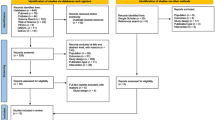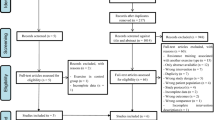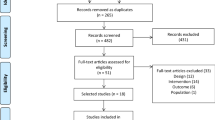Abstract
Fibromyalgia is a chronic disease characterized by generalized skeletal muscle pain and the presence of mental disorders is common among patients. As there is no cure, several treatment alternatives have been investigated, including the practice of resistance training. Thus, the aim of the current study is to analyze the effects of resistance training on the mental health of patients with fibromyalgia. This is a systematic review of the literature that followed the recommendations of the PRISMA statement. The search for articles occurred in May 2020 in the databases PubMed, Embase, Science Direct, Web of Science, PEDro, and CINAHL, as well as Google Scholar for gray literature. The protocol was recorded in PROSPERO and assessment of quality was performed using the Cochrane tool. In total, 481 studies were found in the database searches, of which seven were included in the analysis. The only variables investigated in studies related to mental health were depression and anxiety. The results demonstrate that resistance training reduces symptoms of depression and anxiety in patients with fibromyalgia. It is concluded that resistance training is efficient to improve the mental health of patients with fibromyalgia, reducing depression and anxiety. The main limitation is that few variables related to mental health were analyzed.
Key Points • Resistance training improves the mental health of patients with FM. • The most commonly studied variables related to mental health are depression and anxiety. • The study protocols are similar, starting with low-intensity training and gradually increasing the intensity. |


Similar content being viewed by others
Data availability
Data sharing is not applicable to this article as no new data were created or analyzed in this study.
Code availability
Not applicable
References
Wolfe F, Clauw DJ, Fitzcharles MA et al (2016) 2016 Revisions to the 2010/2011 fibromyalgia diagnostic criteria. Semin Arthritis Rheum 46:319–329. https://doi.org/10.1016/j.semarthrit.2016.08.012
Wolfe F, Clauw DJ, Fitzcharles MA et al (2010) The American College of Rheumatology preliminary diagnostic criteria for fibromyalgia and measurement of symptom severity. Arthritis Care Res 62:600–610. https://doi.org/10.1002/acr.20140
Andrade A, Vilarino GT, Sieczkowska SM et al (2018) The relationship between sleep quality and fibromyalgia symptoms. J Health Psychol:135910531775161. https://doi.org/10.1177/1359105317751615
Borchers AT, Gershwin ME (2015) Fibromyalgia: a critical and comprehensive review. Clin Rev Allergy Immunol 49:100–151. https://doi.org/10.1007/s12016-015-8509-4
Andrade A, Vilarino GT, Sieczkowska SM et al (2018) Acute effects of physical exercises on the inflammatory markers of patients with fibromyalgia syndrome: a systematic review. J Neuroimmunol 316:40–49. https://doi.org/10.1016/j.jneuroim.2017.12.007
Dell’Osso L, Bazzichi L, Baroni S et al (2015) The inflammatory hypothesis of mood spectrum broadened to fibromyalgia and chronic fatigue syndrome. Clin Exp Rheumatol 33:S109–S116
Coskun Benlidayi I (2019) Role of inflammation in the pathogenesis and treatment of fibromyalgia. Rheumatol Int 39:781–791. https://doi.org/10.1007/s00296-019-04251-6
Häuser W, Ablin J, Fitzcharles M-A et al (2015) Fibromyalgia. Nat Rev Dis Primers 1:225–244. https://doi.org/10.1007/978-3-319-59963-2_11
Nijs J, Van Houdenhove B (2009) From acute musculoskeletal pain to chronic widespread pain and fibromyalgia: application of pain neurophysiology in manual therapy practice. Man Ther 14:3–12. https://doi.org/10.1016/j.math.2008.03.001
Andrade A, Vilarino GT, Bevilacqua GG (2017) What is the effect of strength training on pain and sleep in patients with fibromyalgia? Am J Phys Med Rehabil 96:889–893. https://doi.org/10.1097/PHM.0000000000000782
Sánchez-Rodríguez E, Aragonès E, Jensen MP et al (2020) The role of pain-related cognitions in the relationship between pain severity, depression, and pain interference in a sample of primary care patients with both chronic pain and depression. Pain Med:1–12. https://doi.org/10.1093/pm/pnz363
Macfarlane GJ, Kronisch C, Dean LE et al (2017) EULAR revised recommendations for the management of fibromyalgia. Ann Rheum Dis 76:318–328. https://doi.org/10.1136/annrheumdis-2016-209724
Andrade A, Dominski FH, Sieczkowska SM (2020) What we already know about the effects of exercise in patients with fibromyalgia: an umbrella review. Semin Arthritis Rheum. https://doi.org/10.1016/j.semarthrit.2020.02.003
Andrade A, de Azevedo Klumb Steffens R, Sieczkowska SM et al (2018) A systematic review of the effects of strength training in patients with fibromyalgia: clinical outcomes and design considerations. Adv Rheumatol 58:36. https://doi.org/10.1186/s42358-018-0033-9
Busch AJ, Webber SC, Richards RS et al (2013) Resistance exercise training for fibromyalgia. Cochrane Database Syst Rev 2013. https://doi.org/10.1002/14651858.CD010884
Jones KD (2015) Recommendations for resistance training in patients with fibromyalgia. Arthritis Res Ther 17:258. https://doi.org/10.1186/s13075-015-0782-3
Häkkinen A, Häkkinen K, Hannonen P, Alen M (2001) Strength training induced adaptations in neuromuscular function of premenopausal women with fibromyalgia: comparison with healthy women. Ann Rheum Dis 60:21–26. https://doi.org/10.1136/ard.60.1.21
Valkeinen H, Alen M, Hannonen P et al (2004) Changes in knee extension and flexion force, EMG and functional capacity during strength training in older females with fibromyalgia and healthy controls. Rheumatology 43:225–228. https://doi.org/10.1093/rheumatology/keh027
Figueroa A, Kingsley JD, Mcmillan V, Panton LB (2008) Resistance exercise training improves heart rate variability in women with fibromyalgia. Clin Physiol Funct Imaging 28:49–54. https://doi.org/10.1111/j.1475-097X.2007.00776.x
Ericsson A, Palstam A, Larsson A et al (2016) Resistance exercise improves physical fatigue in women with fibromyalgia: a randomized controlled trial. Arthritis Res Ther 18:176. https://doi.org/10.1186/s13075-016-1073-3
Bircan Ç, Karasel SA, Akgün B et al (2008) Effects of muscle strengthening versus aerobic exercise program in fibromyalgia. Rheumatol Int 28:527–532. https://doi.org/10.1007/s00296-007-0484-5
Gavi MBRO, Vassalo DV, Amaral FT et al (2014) Strengthening exercises improve symptoms and quality of life but do not change autonomic modulation in fibromyalgia: a randomized clinical trial. PLoS One 9:e90767. https://doi.org/10.1371/journal.pone.0090767
World Health Organization (2019) Mental Disorders. https://www.who.int/newsroom/fact-sheets/detail/mental-disorders. Acessed 23 January 2021
Løge-Hagen JS, Sæle A, Juhl C et al (2019) Prevalence of depressive disorder among patients with fibromyalgia: systematic review and meta-analysis. J Affect Disord 245:1098–1105. https://doi.org/10.1016/j.jad.2018.12.001
Soriano-Maldonado A, Amris K, Ortega FB et al (2015) Association of different levels of depressive symptoms with symptomatology, overall disease severity, and quality of life in women with fibromyalgia. Qual Life Res 24:2951–2957. https://doi.org/10.1007/s11136-015-1045-0
Gota CE, Kaouk S, Wilke WS (2017) The impact of depressive and bipolar symptoms on socioeconomic status, core symptoms, function and severity of fibromyalgia. Int J Rheum Dis 20:326–339. https://doi.org/10.1111/1756-185X.12603
Andrade A, de Azevedo Klumb Steffens R, Vilarino GT et al (2020) Preferred exercise and mental health of the patients with fibromyalgia syndrome. Complement Ther Clin Pract 40:101195. https://doi.org/10.1016/j.ctcp.2020.101195
Andrade A, de Azevedo Klumb Steffens R, Sieczkowska SM et al (2019) Acute effect of strength training on mood of patients with fibromyalgia syndrome. Reumatismo 71:141–147. https://doi.org/10.4081/reumatismo.2019.1169
Brandt R, Fonseca ABP, de Oliveira Amorim LG et al (2011) Perfil de humor de mulheres com fibromialgia. J Bras Psiquiatr 60:217–219. https://doi.org/10.1590/s0047-20852011000300011
Moher D, Shamseer L, Clarke M et al (2015) Preferred reporting items for systematic review and meta-analysis protocols (PRISMA-P) 2015 statement. Rev Esp Nutr 20:148–160. https://doi.org/10.1186/2046-4053-4-1
Wolfe F, Smythe HA, Yunus MB et al (1990) The American College of Rheumatology 1990 Criteria for the Classification of Fibromyalgia. Report of the Multicenter Criteria Committee. Arthritis Rheum 33:160–172
Ouzzani M, Hammady H, Fedorowicz Z, Elmagarmid A (2016) Rayyan-a web and mobile app for systematic reviews. Syst Rev 5. https://doi.org/10.1186/s13643-016-0384-4
Higgins JPT, Altman DG, Gøtzsche PC et al (2011) The Cochrane Collaboration’s tool for assessing risk of bias in randomised trials. BMJ 343:d5928. https://doi.org/10.1136/bmj.d5928
Cohen J (1960) A Coefficient of Agreement for Nominal Scales. Educ Psychol Meas 20:37–46. https://doi.org/10.1177/001316446002000104
Andrade A, Sieczkowska SM, Vilarino GT (2019) Resistance training improves quality of life and associated factors in patients with fibromyalgia syndrome. PM R 11:703–709. https://doi.org/10.1016/j.pmrj.2018.09.032
Jones KD, Burckhardt CS, Clark SR et al (2002) A randomized controlled trial of muscle strengthening versus flexibility training in fibromyalgia. J Rheumatol 29:1041–1048
Assumpção A, Matsutani LA, Yuan SL et al (2018) Muscle stretching exercises and resistance training in fibromyalgia: which is better? A three-arm randomized controlled trial. Eur J Phys Rehabil Med 54:663–670. https://doi.org/10.23736/s1973-9087.17.04876-6
Andrade A, Steffens R d AK, Vilarino GT et al (2017) Does volume of physical exercise have an effect on depression in patients with fibromyalgia? J Affect Disord 208:214–217. https://doi.org/10.1016/j.jad.2016.10.003
Galvez-Sánchez CM, Duschek S, Del Paso GAR (2019) Psychological impact of fibromyalgia: current perspectives. Psychol Res Behav Manag 12:117–127. https://doi.org/10.2147/PRBM.S178240
Andrade A, Vilarino GT, de Liz CM, Steffens R d AK (2017) Effectiveness of a strength training program for patients with fibromyalgia syndrome: feasibility study. ConScientiae Saúde 16:169–176. https://doi.org/10.5585/conssaude.v16n2.7100
Acknowledgements
The authors thank the Foundation for Research and Innovation Support of the State of Santa Catarina (FAPESC) for the financial support - PAP 2018 - NO. 04/2018 - grant Nº 2019TR1154
Funding
Foundation for Research and Innovation Support of the State of Santa Catarina (FAPESC) - PAP 2018 - NO. 04/2018 - grant Nº 2019TR1154.
Author information
Authors and Affiliations
Contributions
Guilherme Torres Vilarino: Conceptualization, writing—original draft. Leonardo Vidal Andreato: Writing—review and editing. Loiane Cristina de Souza: Managed the literature searches and analyses and writing. Joaquim Henrique Lorenzetti Branco: Conceptualization and managed the literature searches, analyses, and writing. Alexandro Andrade: Writing—review and editing and supervision. All authors have contributed significantly to this manuscript and agree with its content.
Corresponding author
Ethics declarations
Disclosures
None
Additional information
Publisher’s note
Springer Nature remains neutral with regard to jurisdictional claims in published maps and institutional affiliations.
Supplementary Information
ESM 1
(DOCX 16 kb).
Rights and permissions
About this article
Cite this article
Vilarino, G.T., Andreato, L.V., de Souza, L.C. et al. Effects of resistance training on the mental health of patients with fibromyalgia: a systematic review. Clin Rheumatol 40, 4417–4425 (2021). https://doi.org/10.1007/s10067-021-05738-z
Received:
Revised:
Accepted:
Published:
Issue Date:
DOI: https://doi.org/10.1007/s10067-021-05738-z




